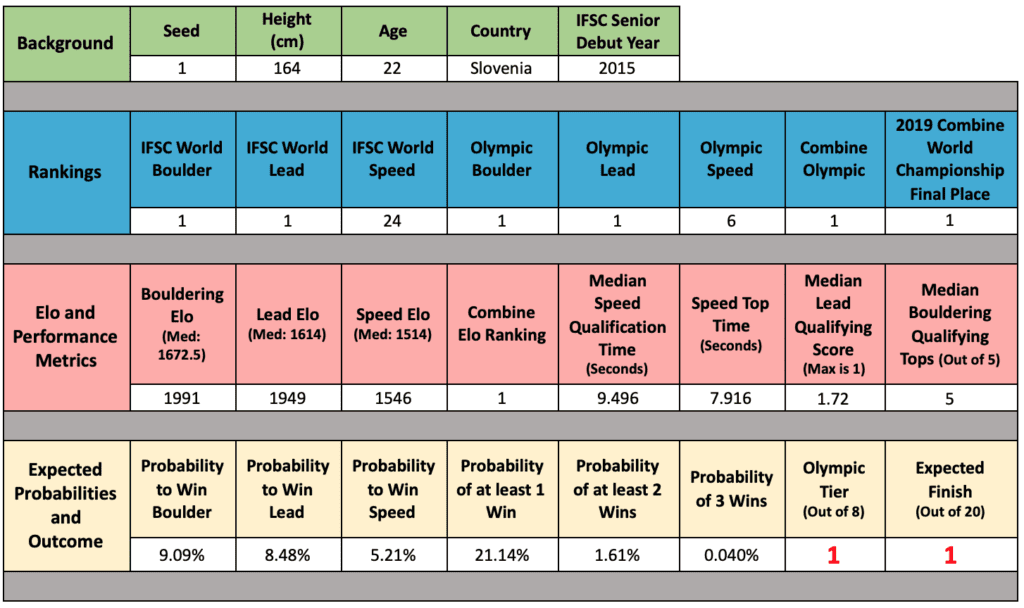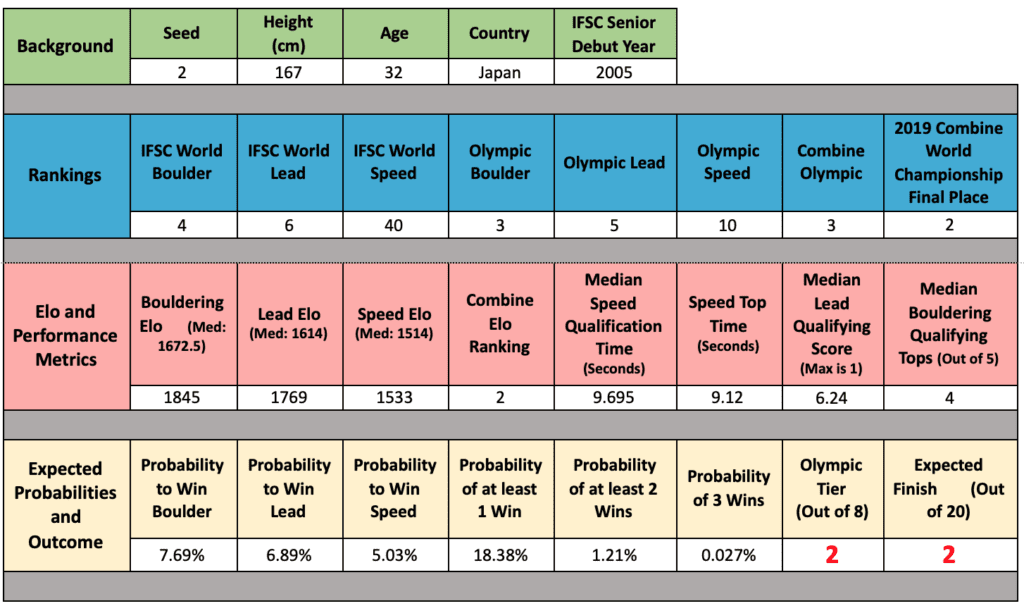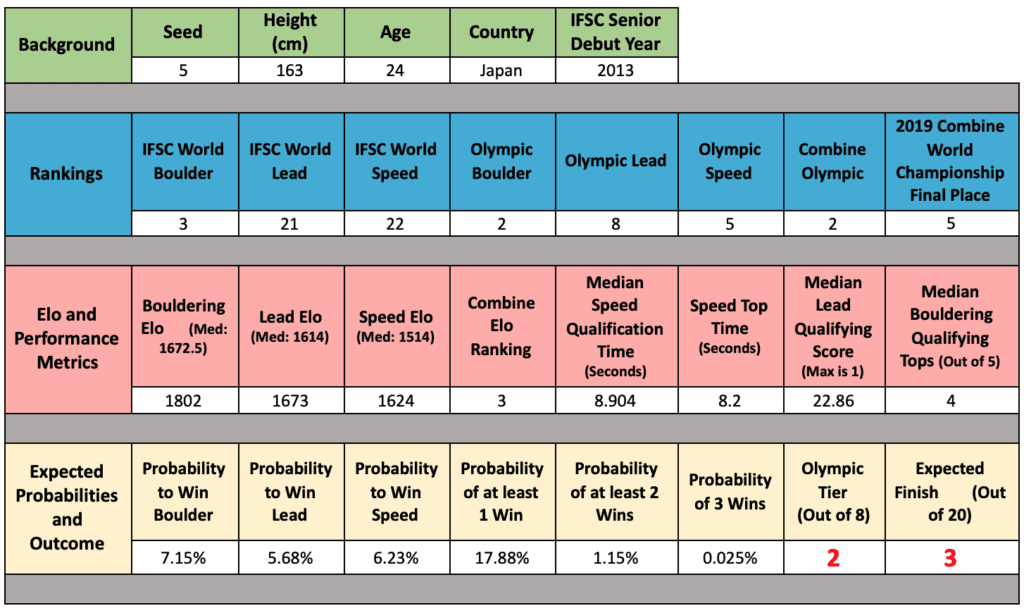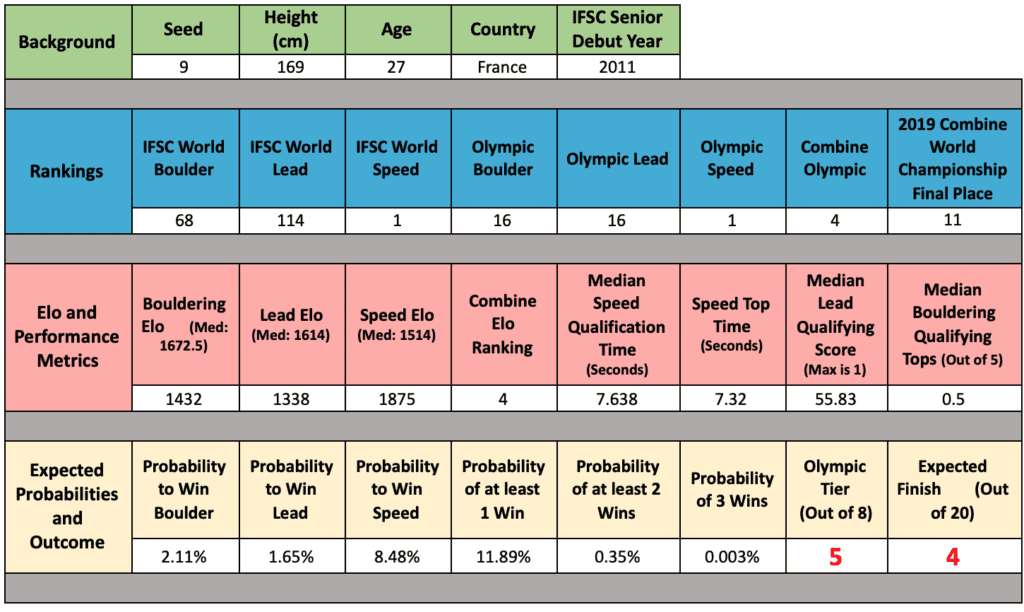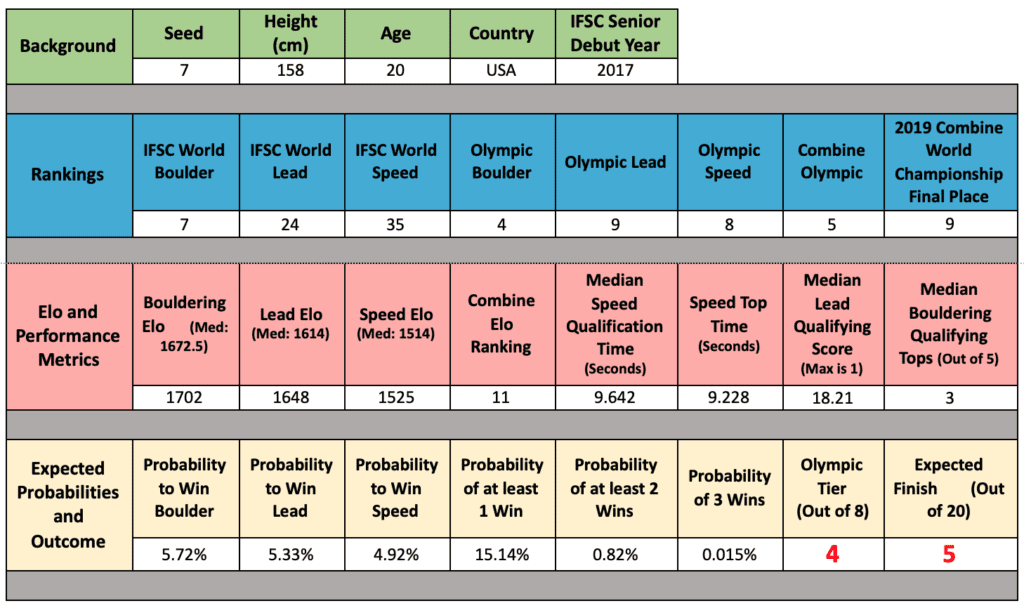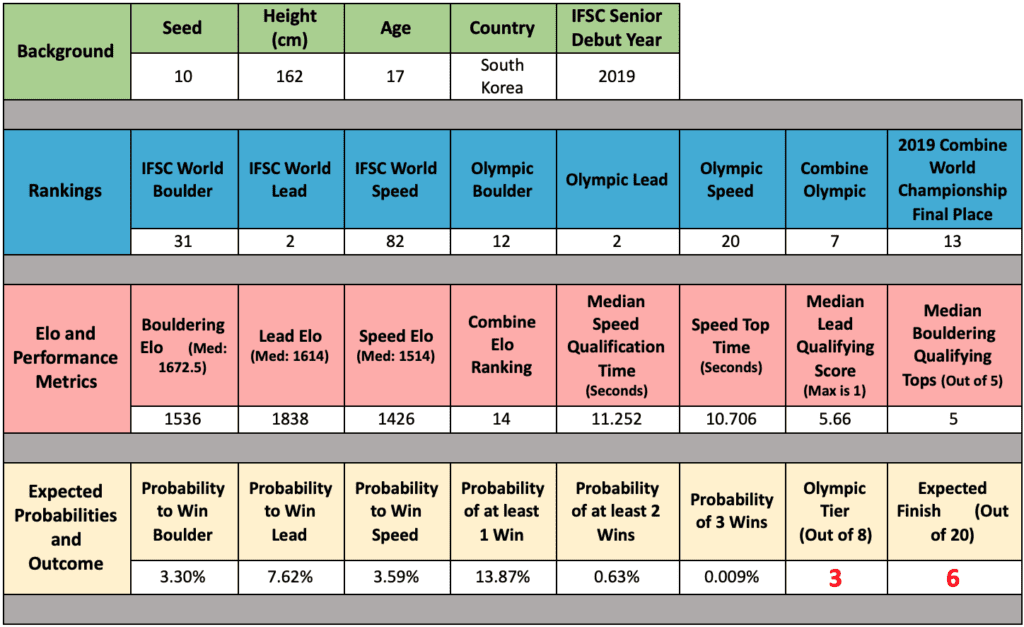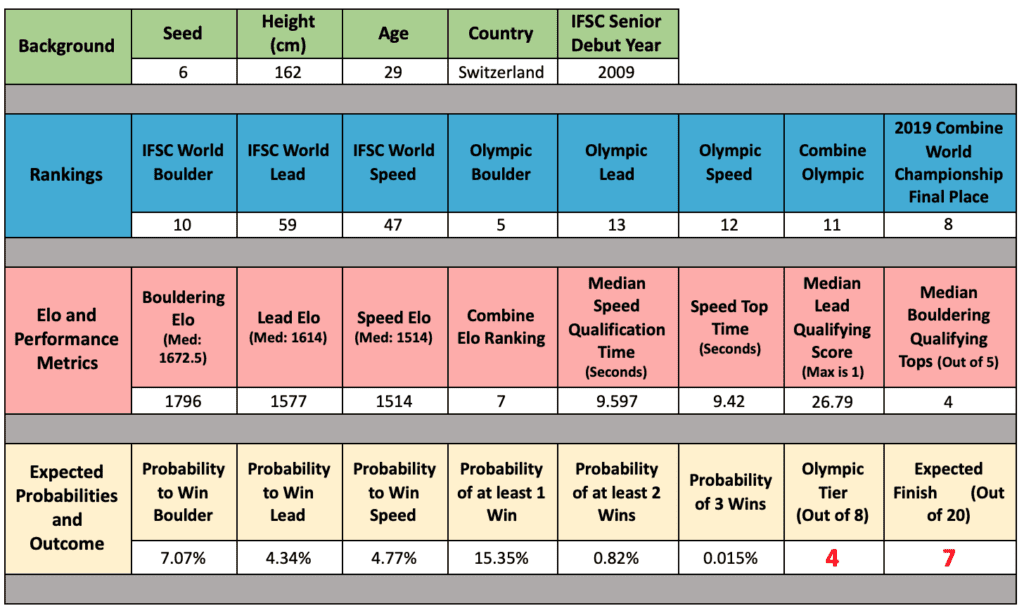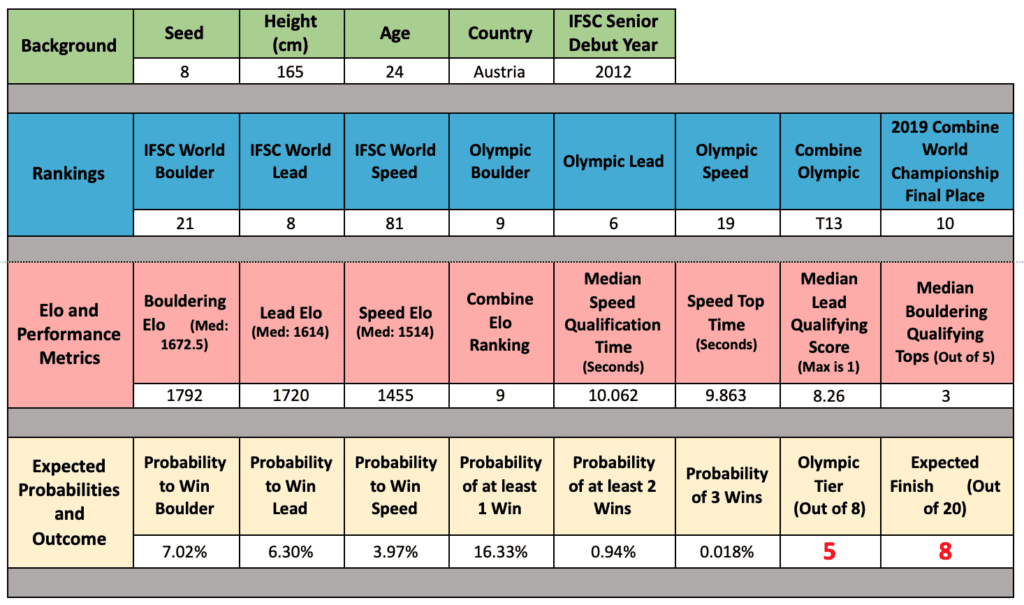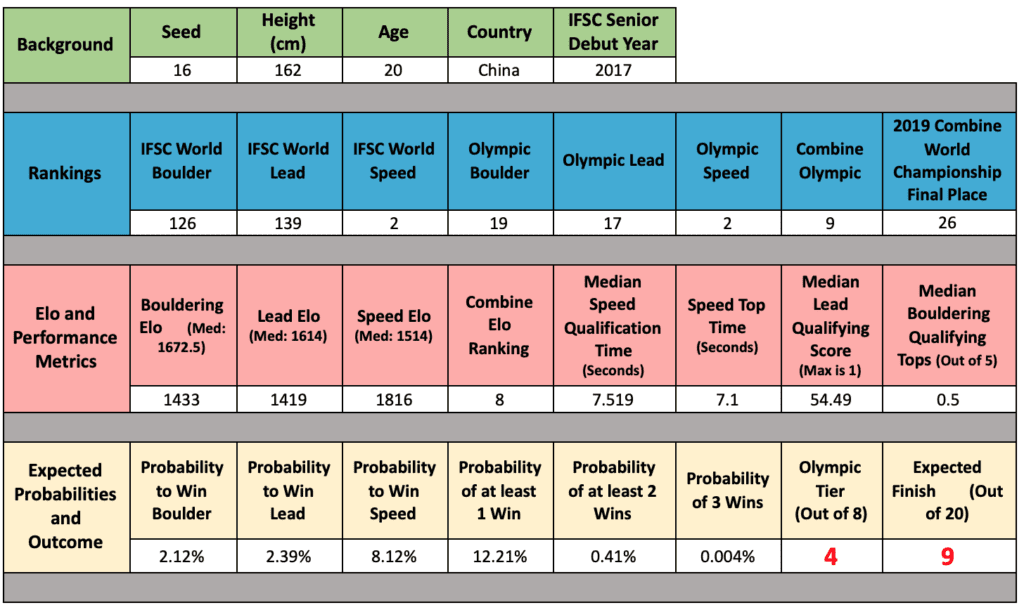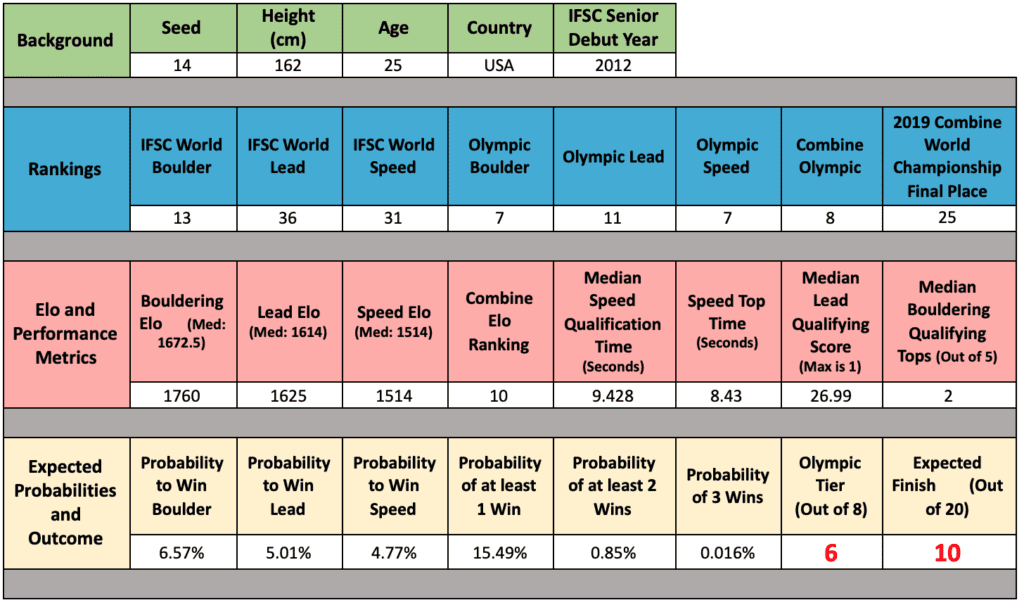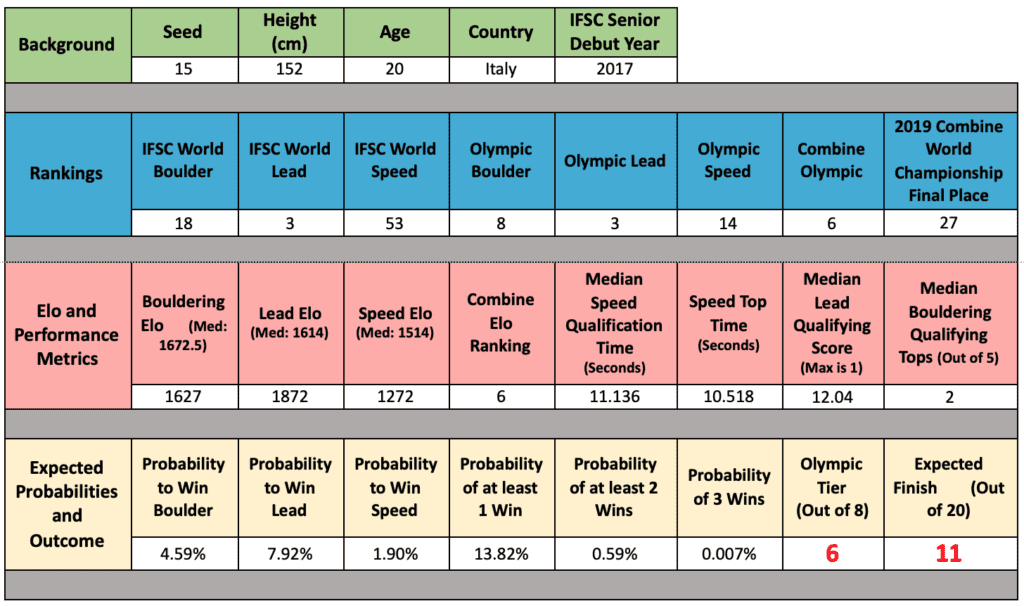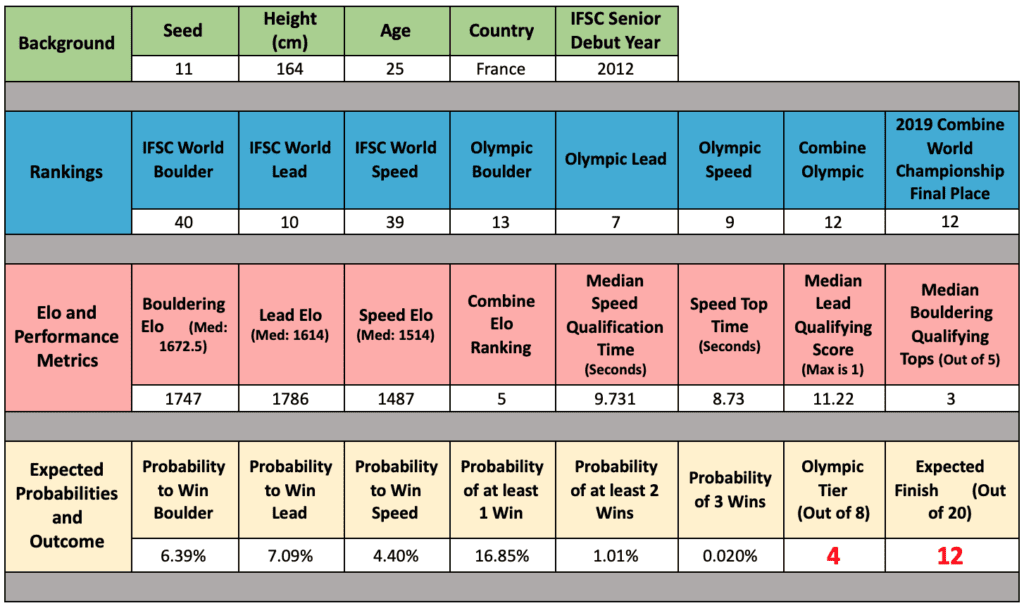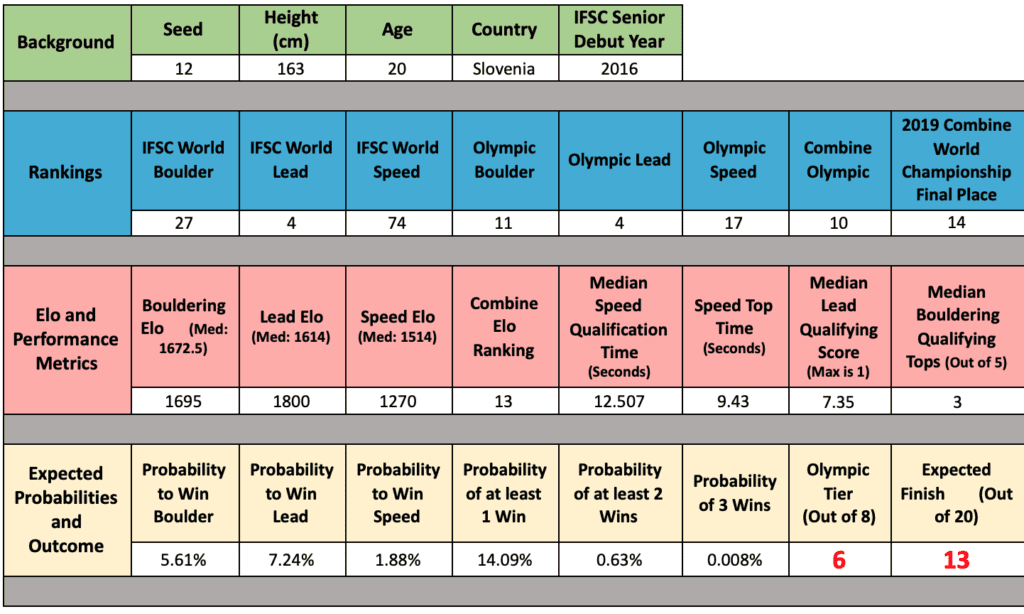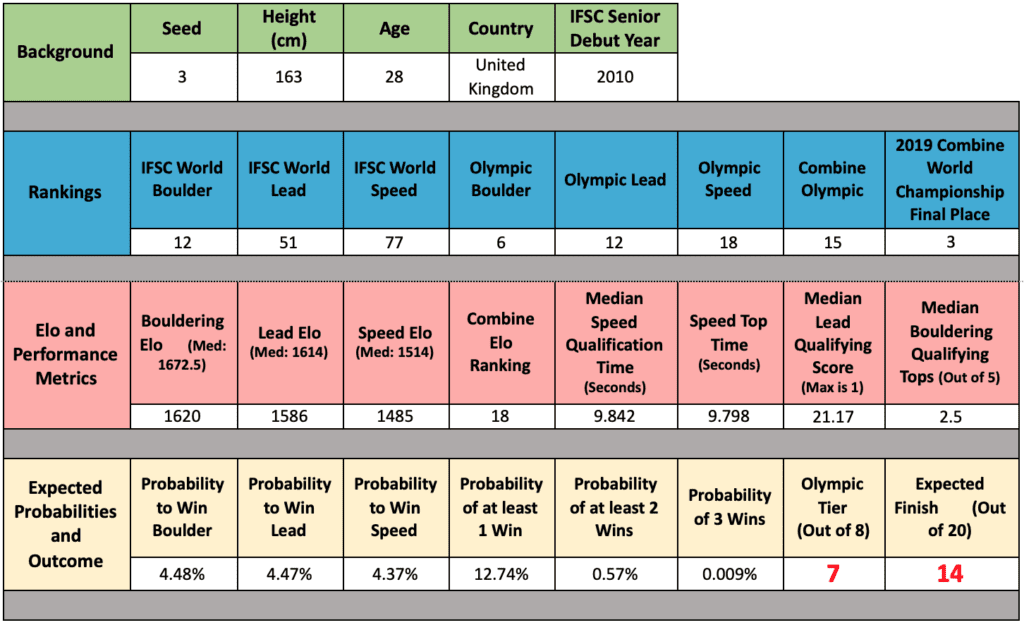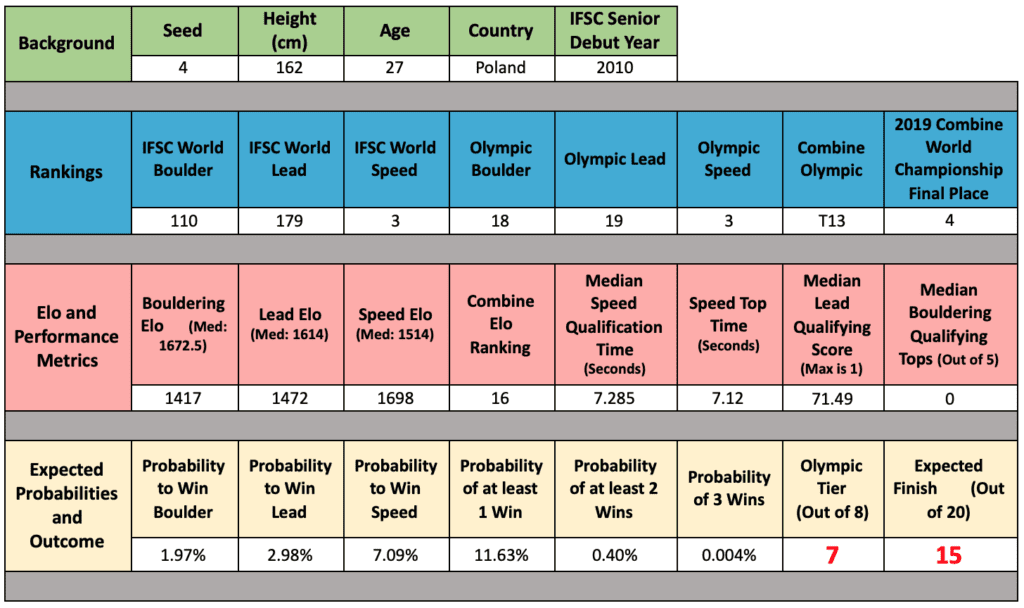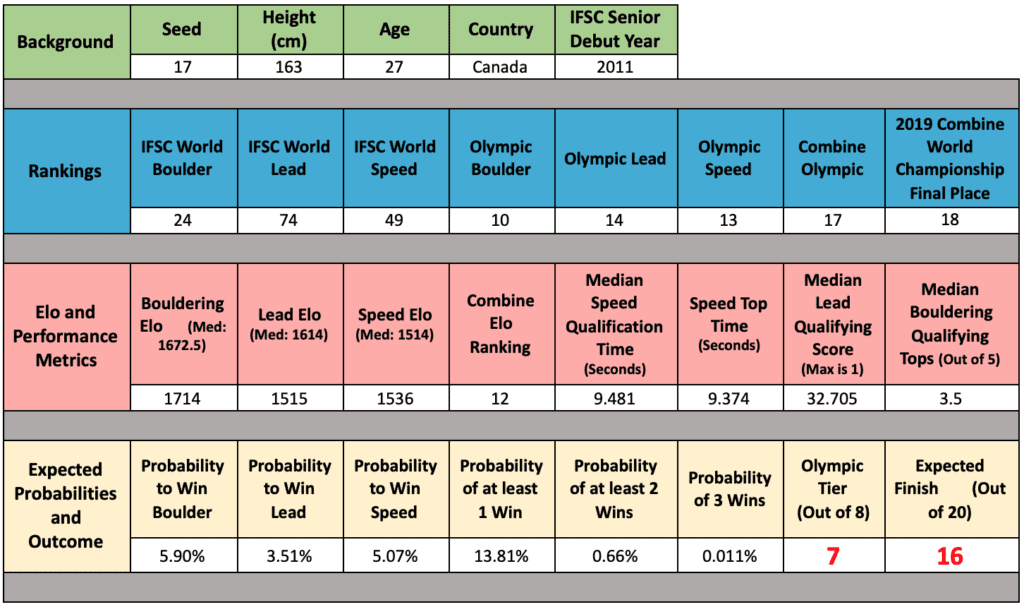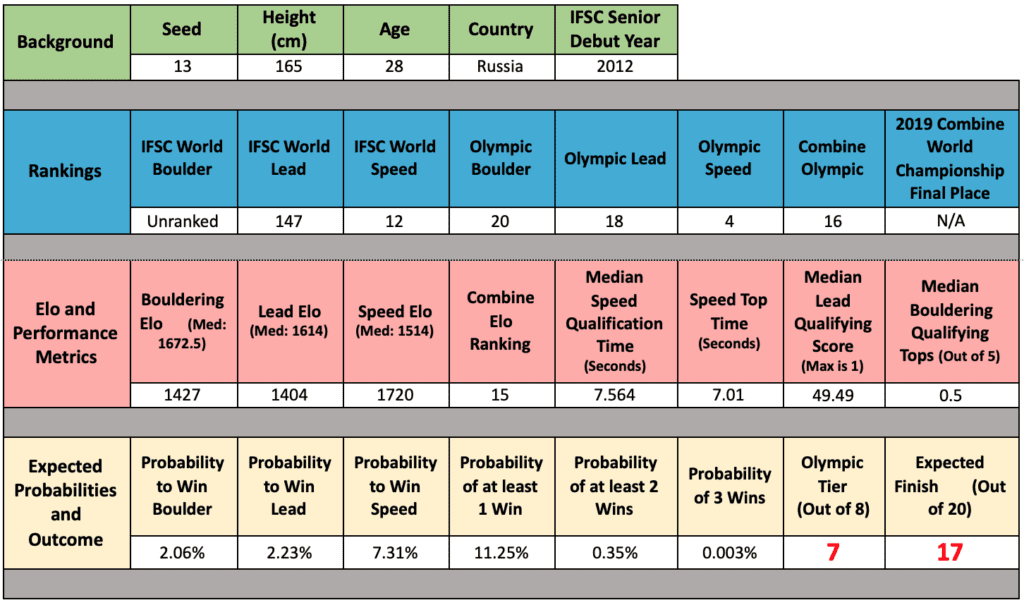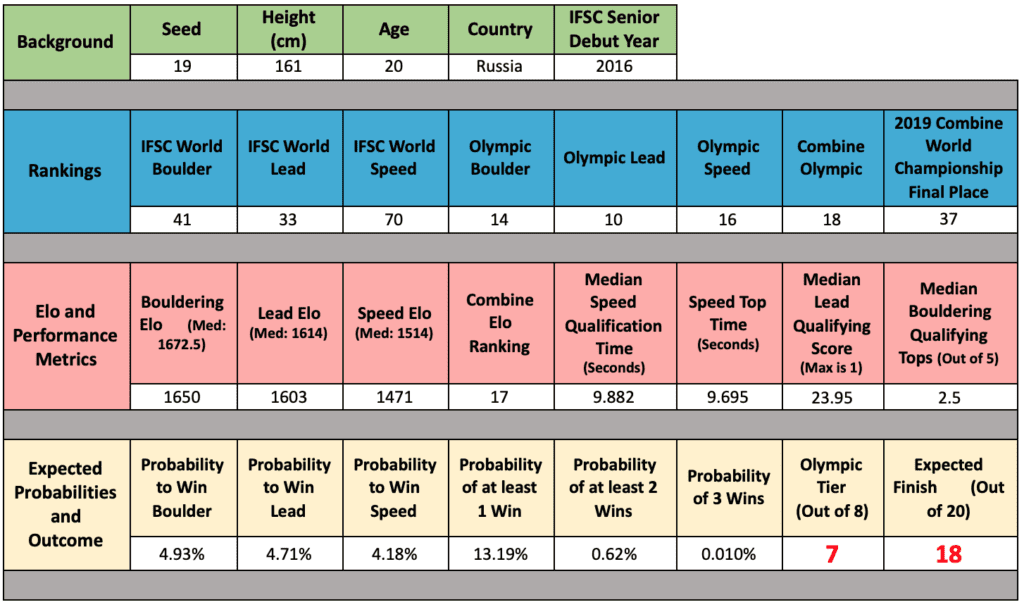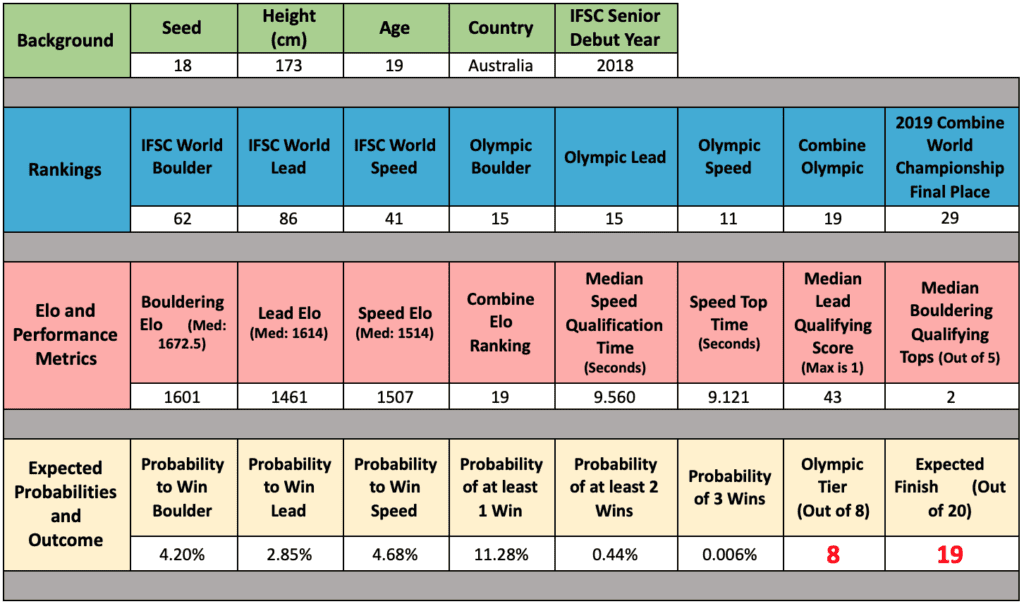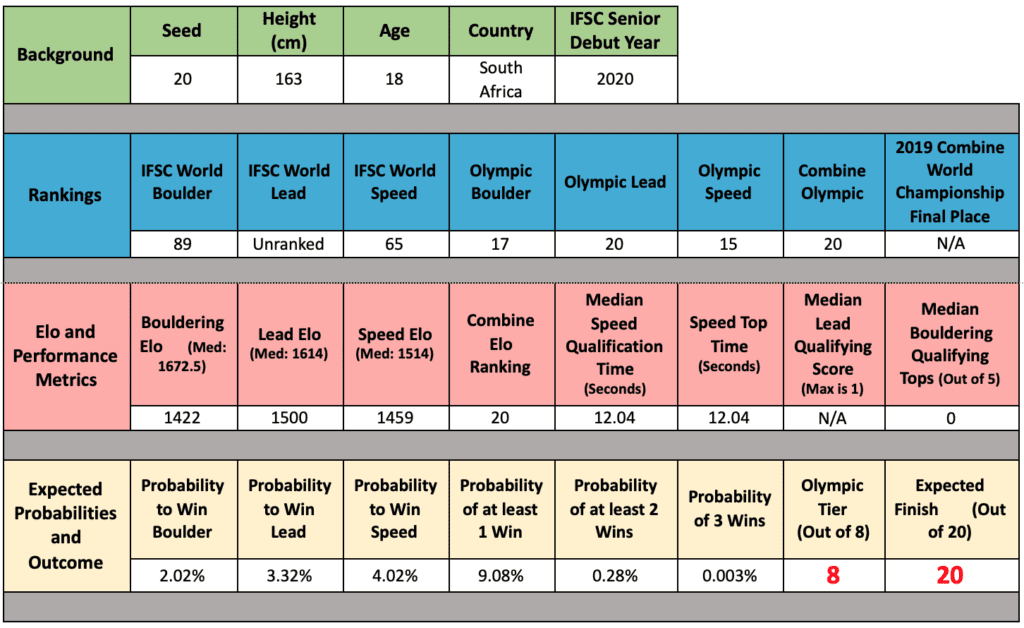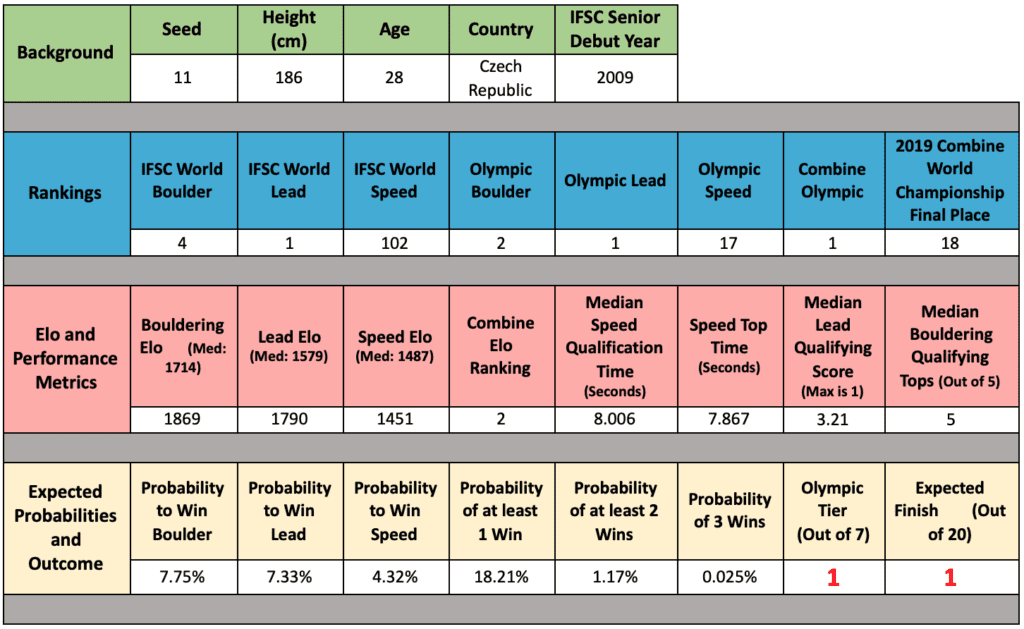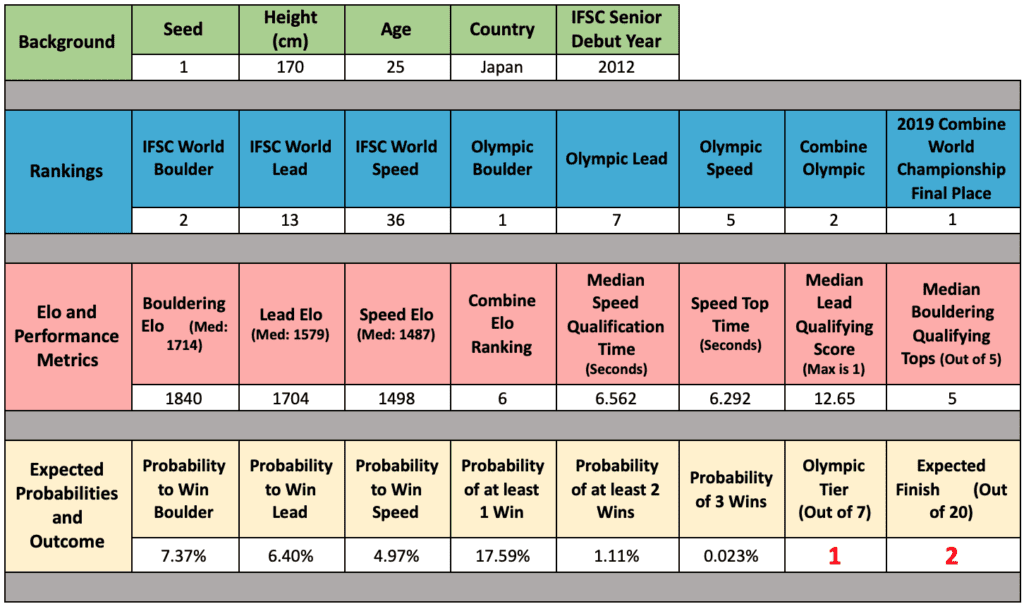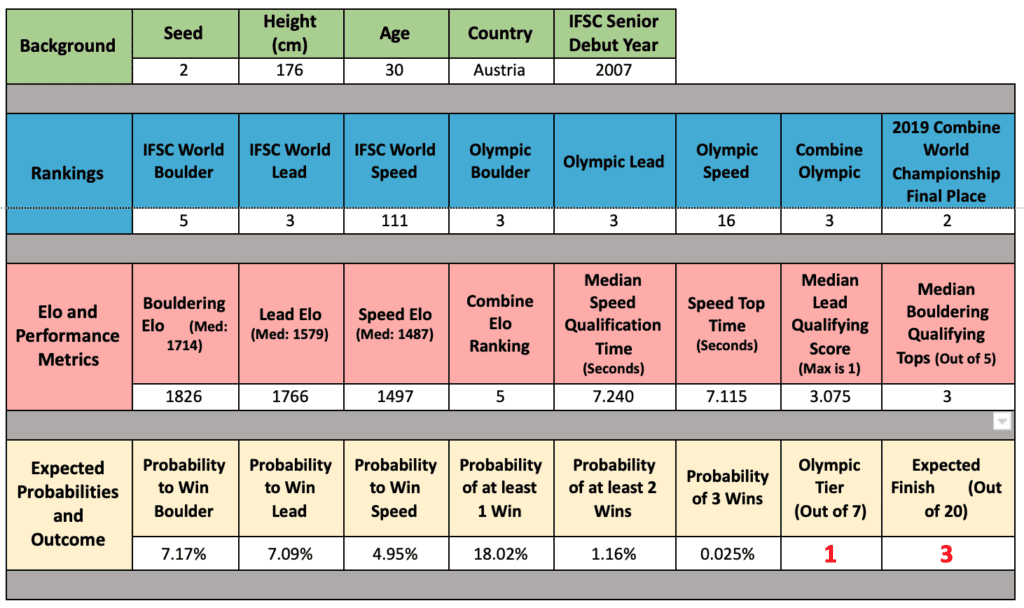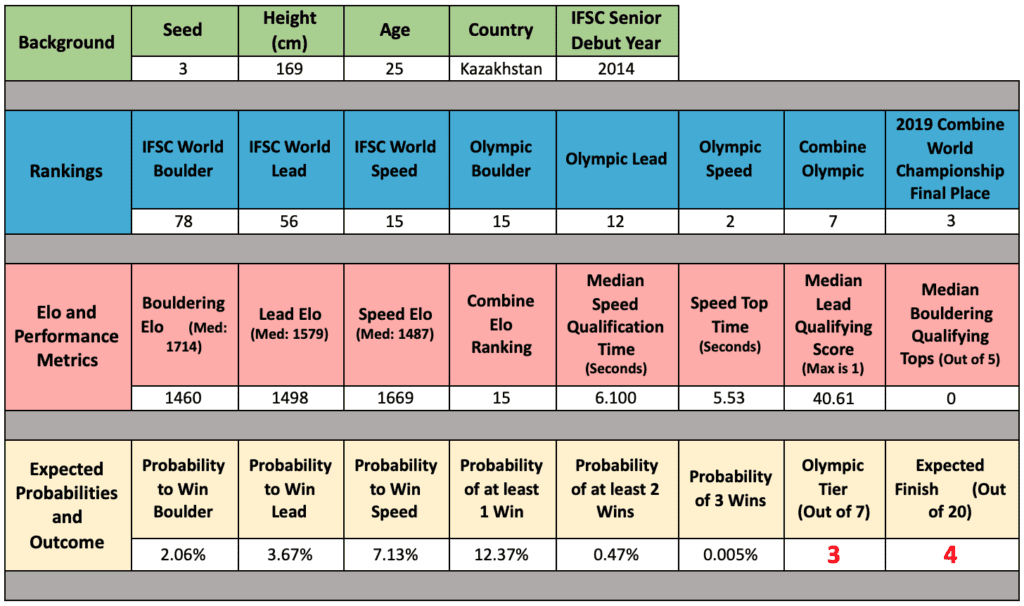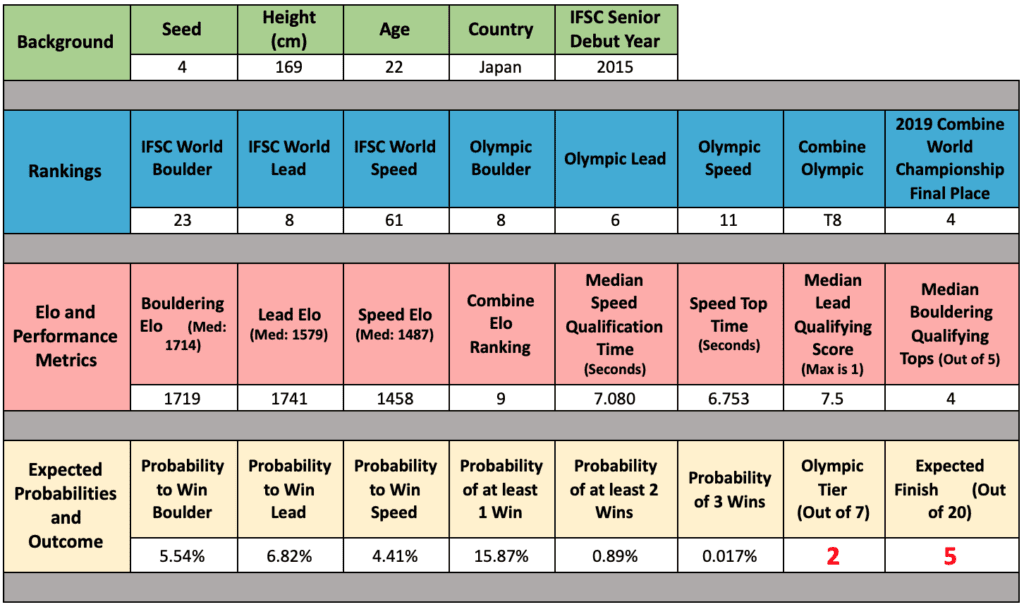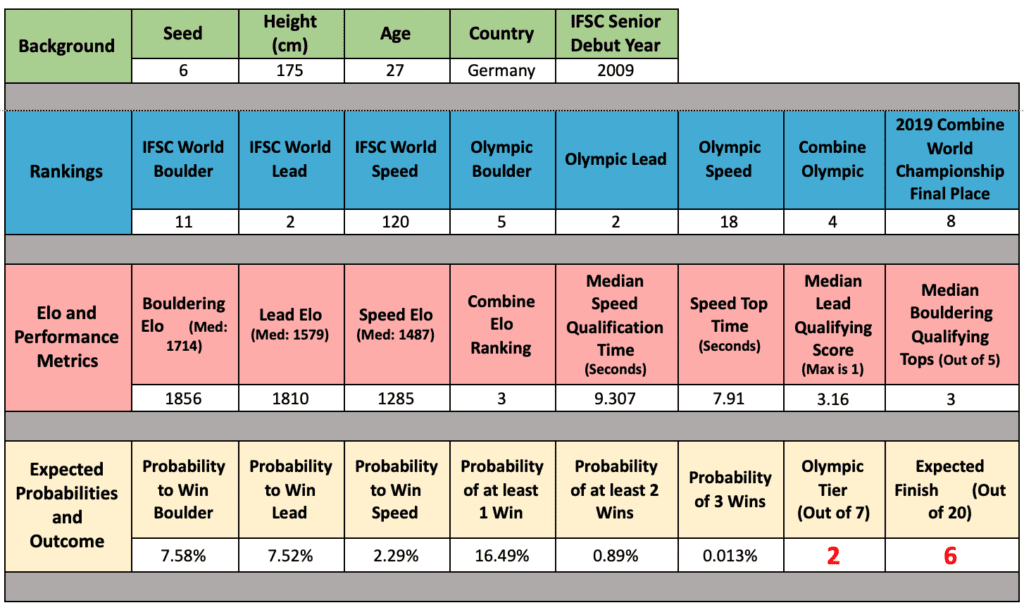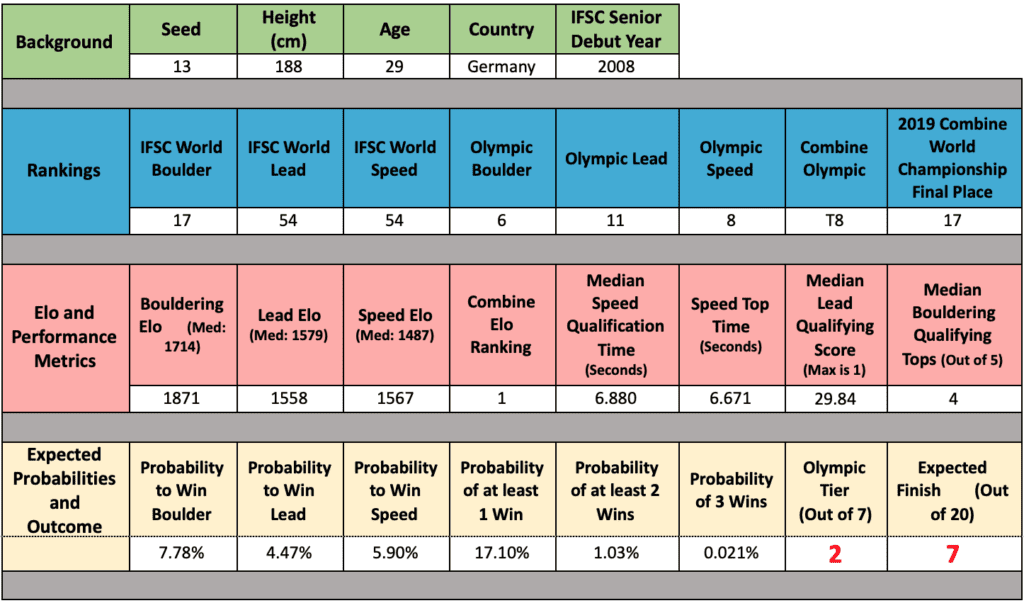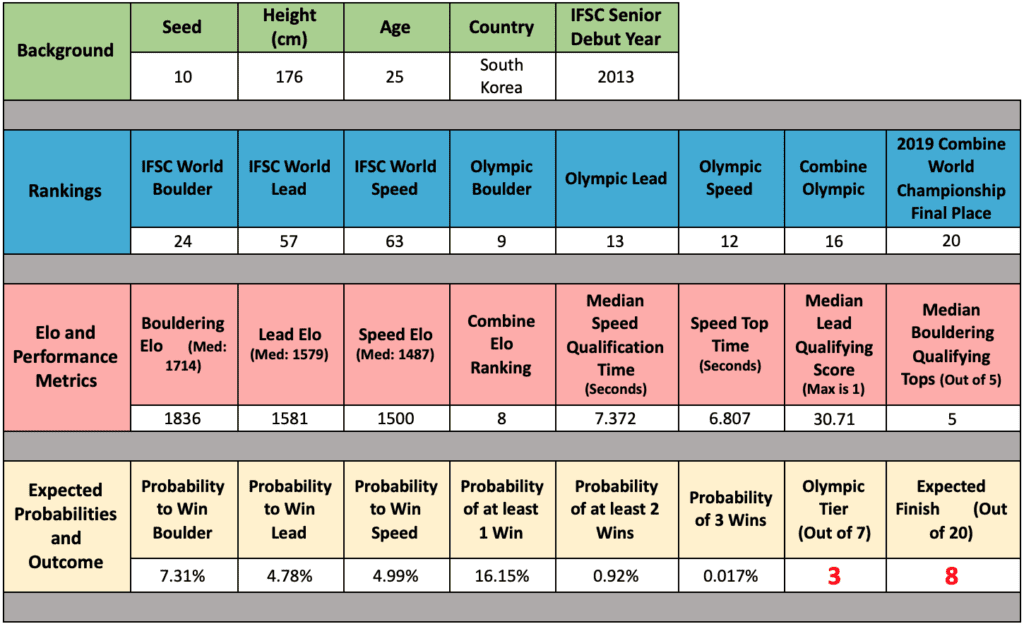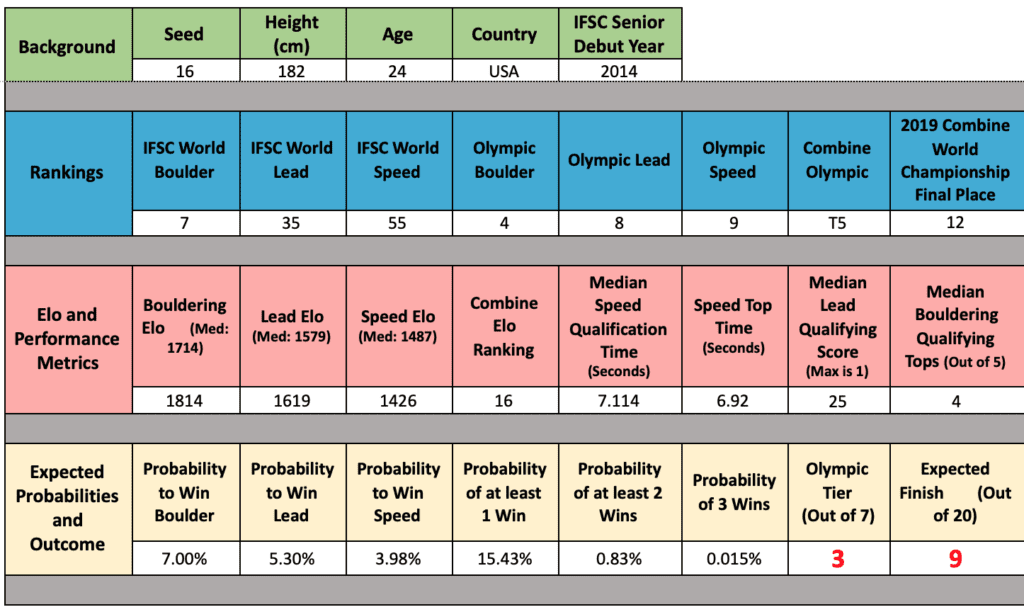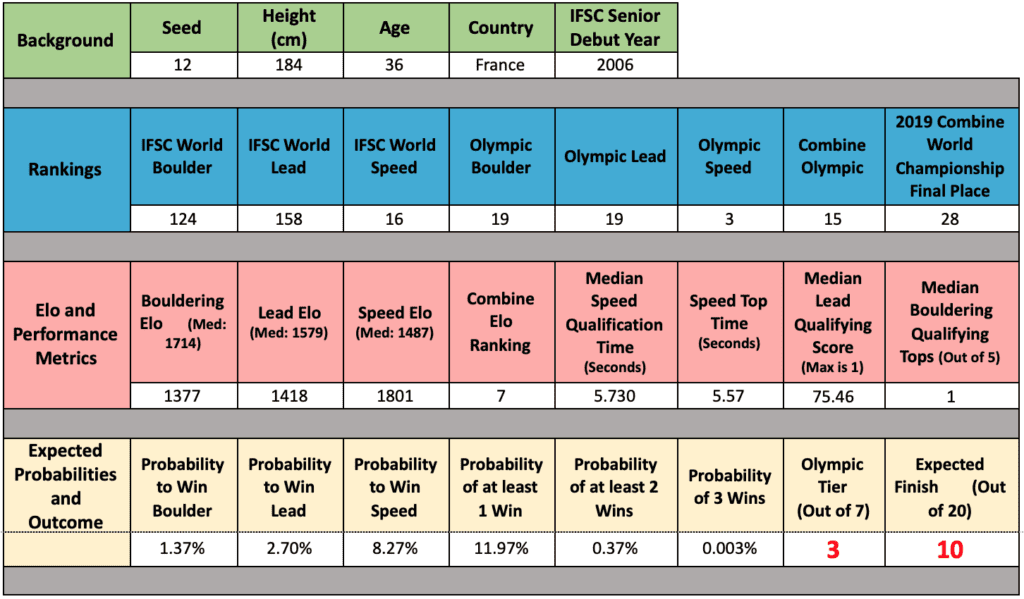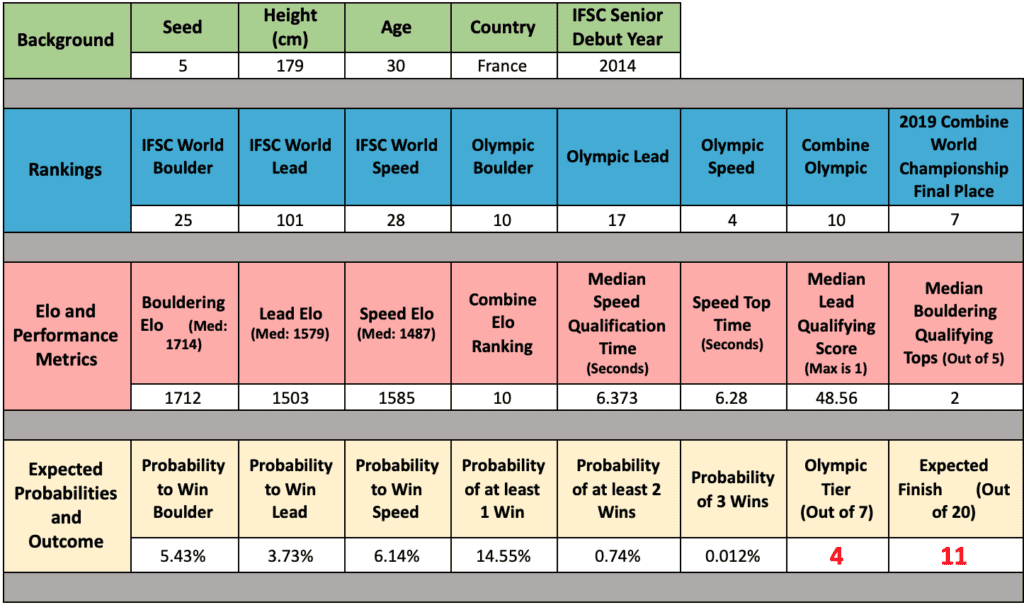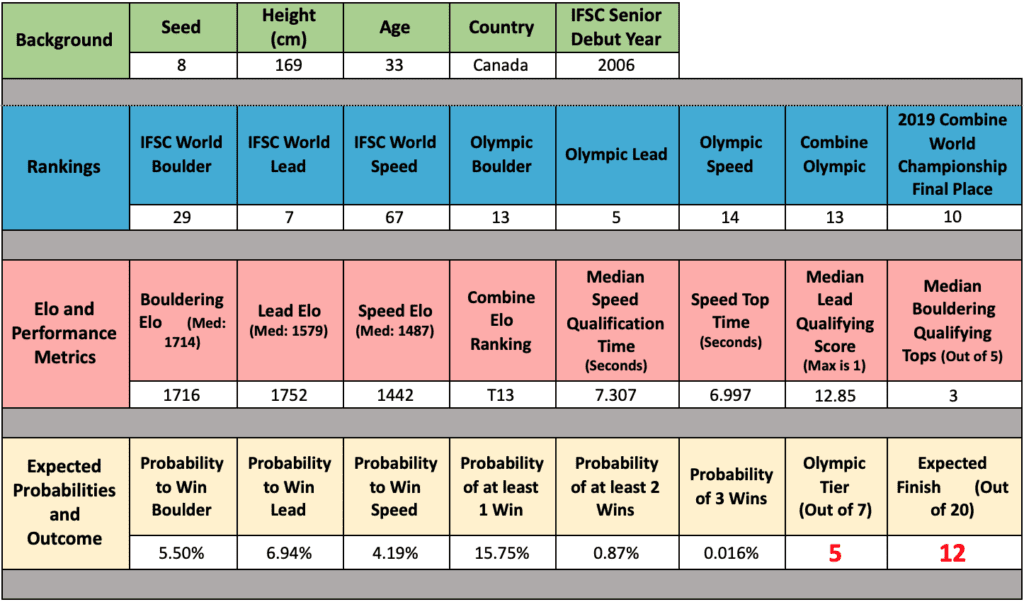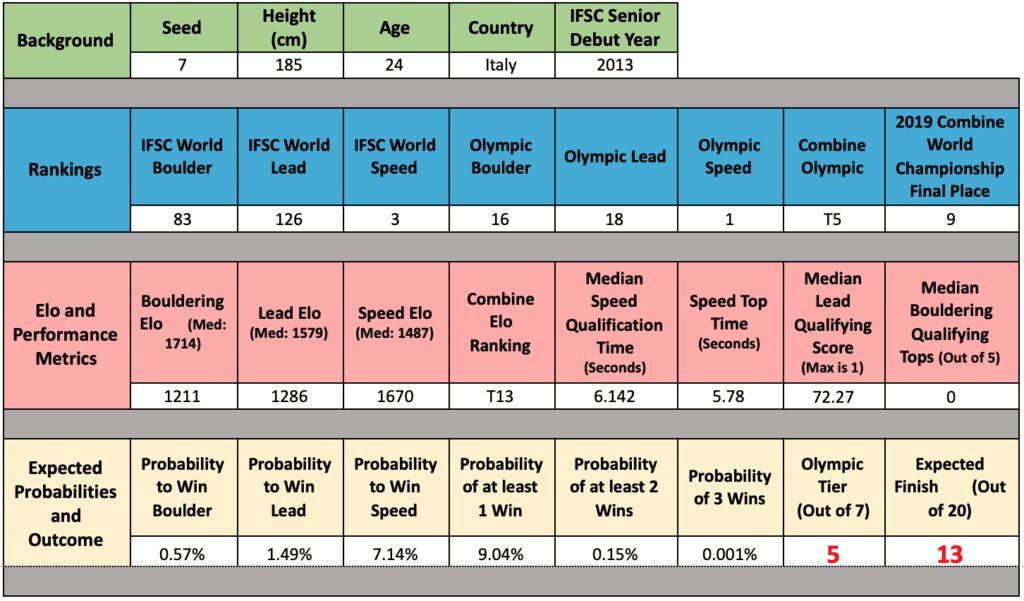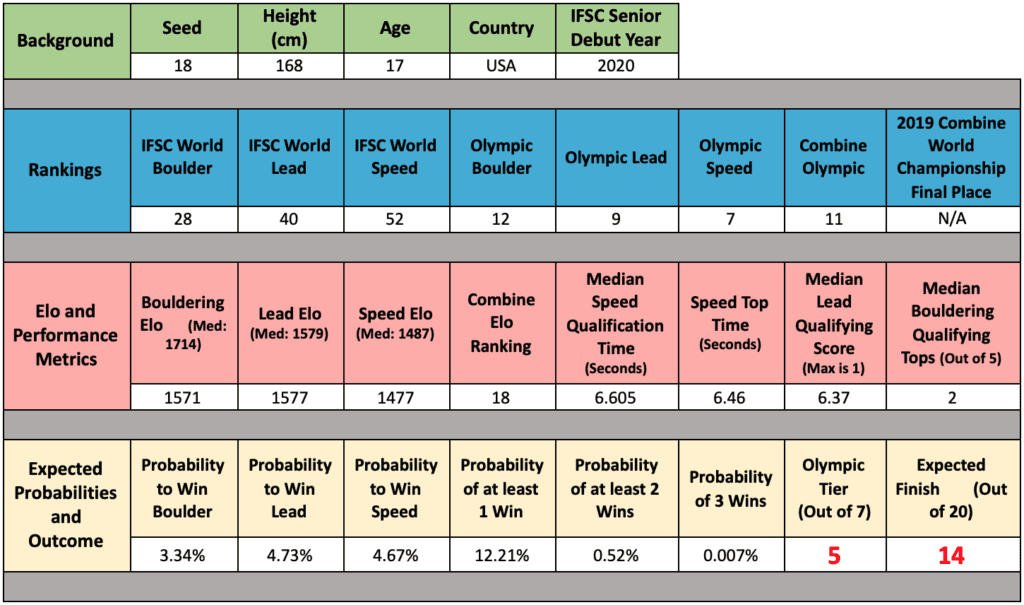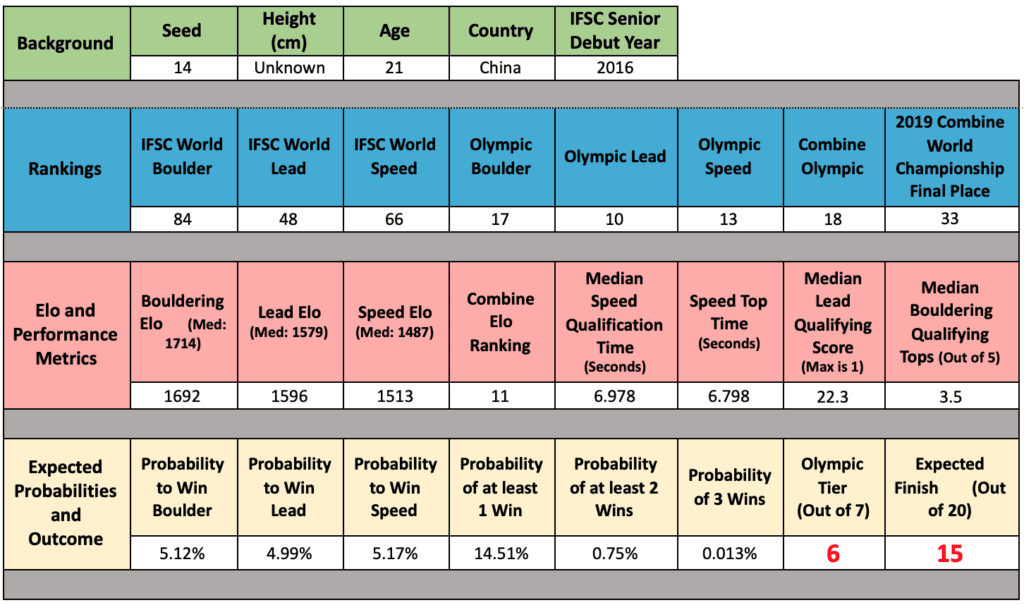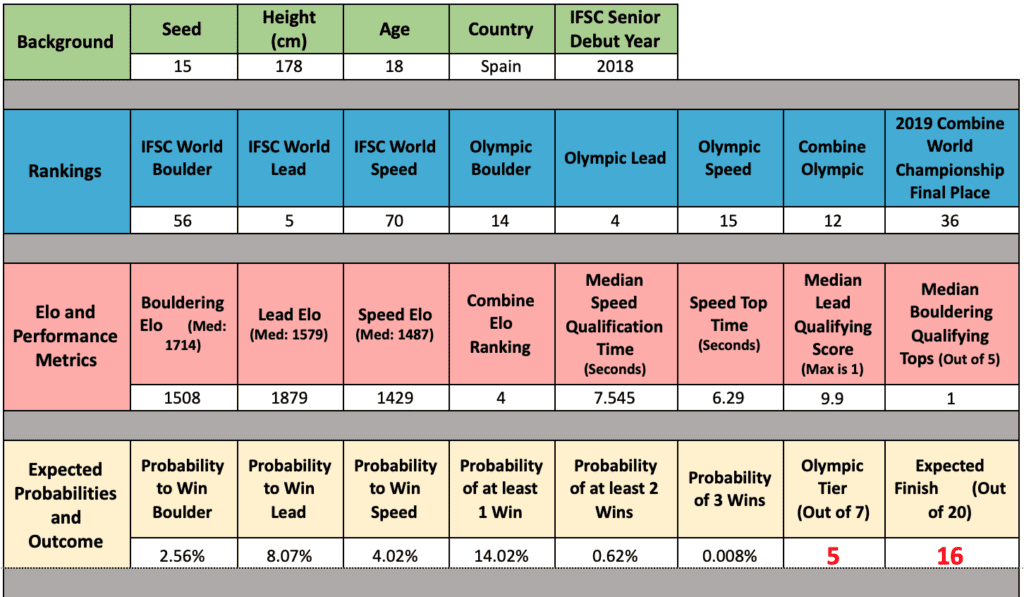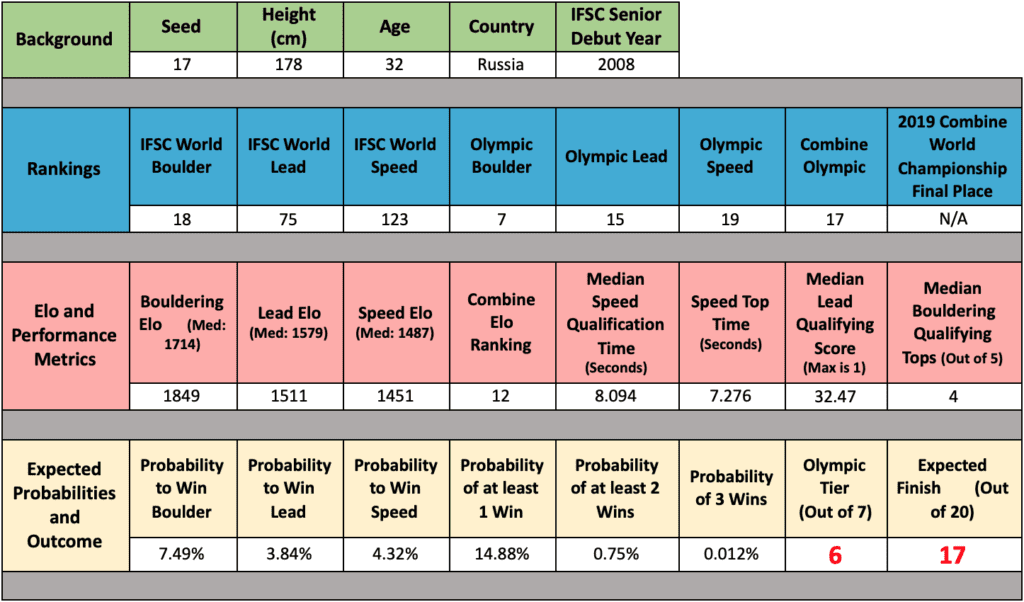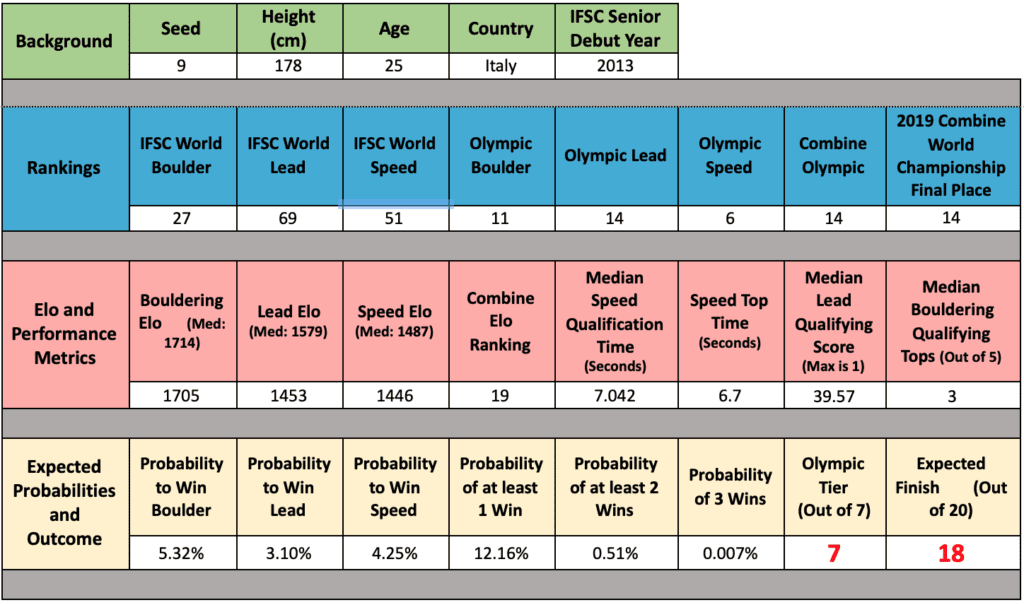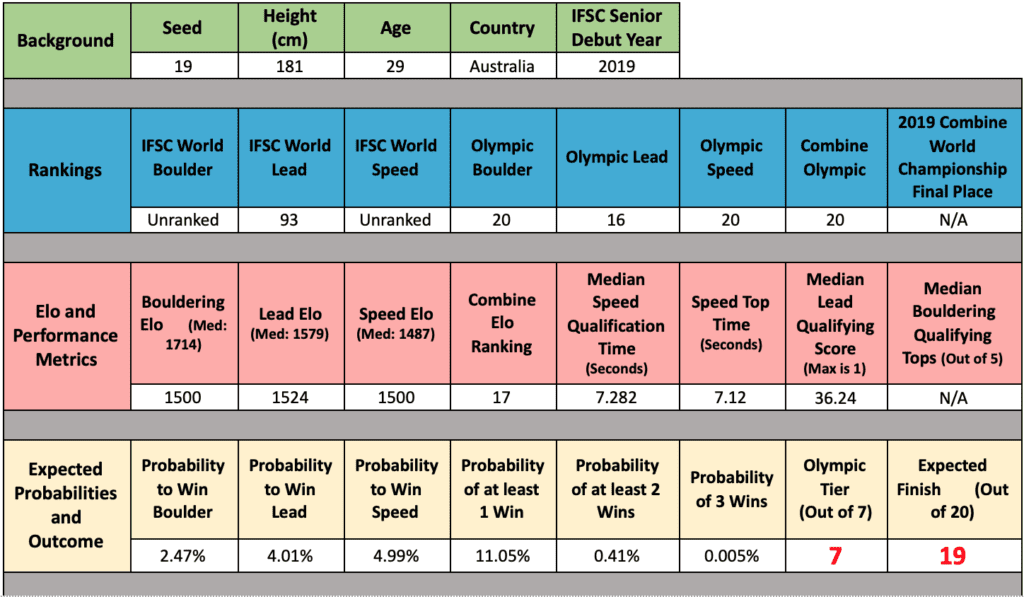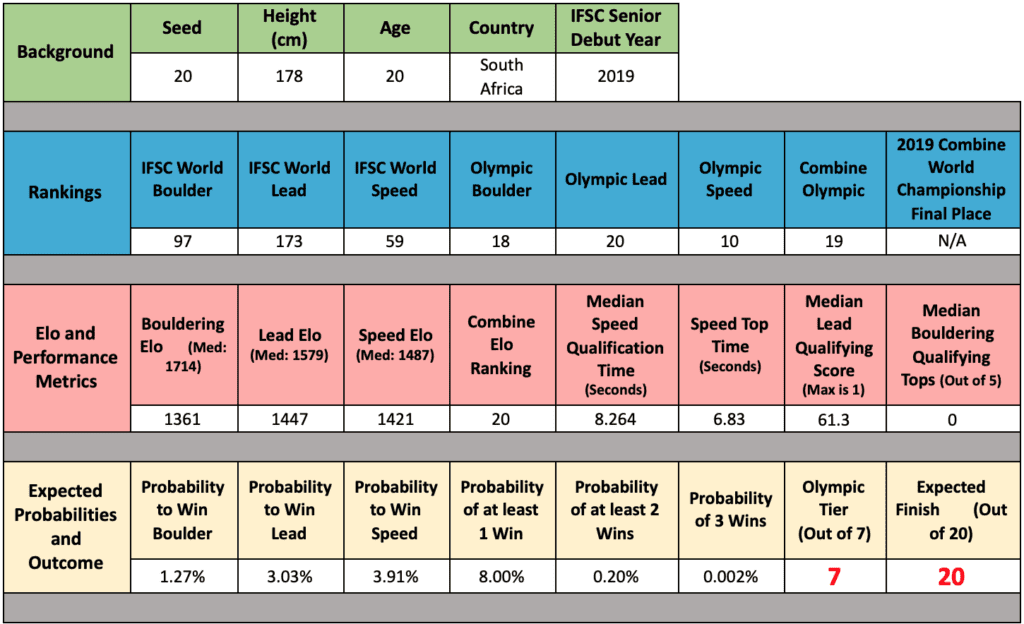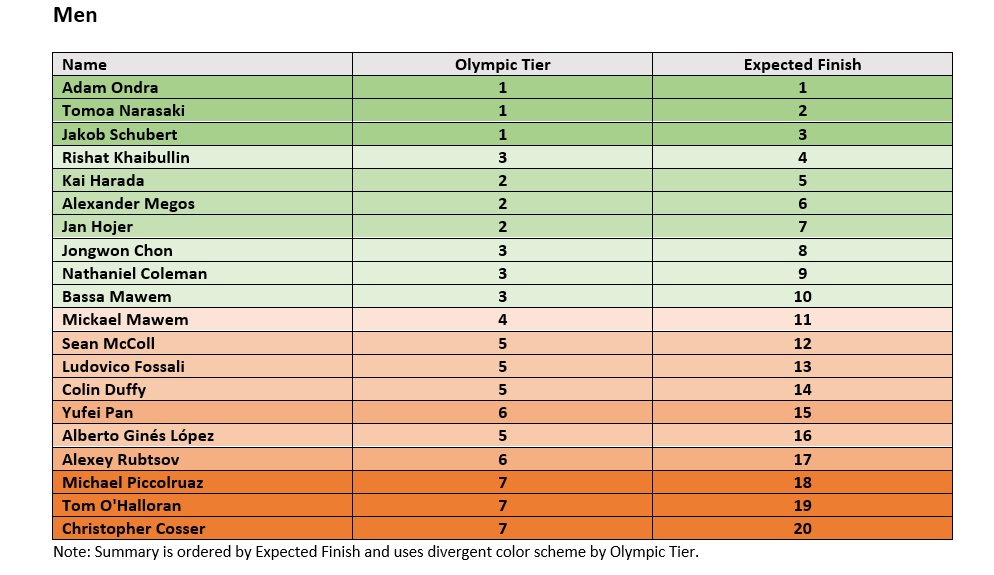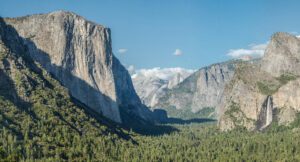Moneyclimb
A data driven ranking of every climber in the Olympics, and predicted result
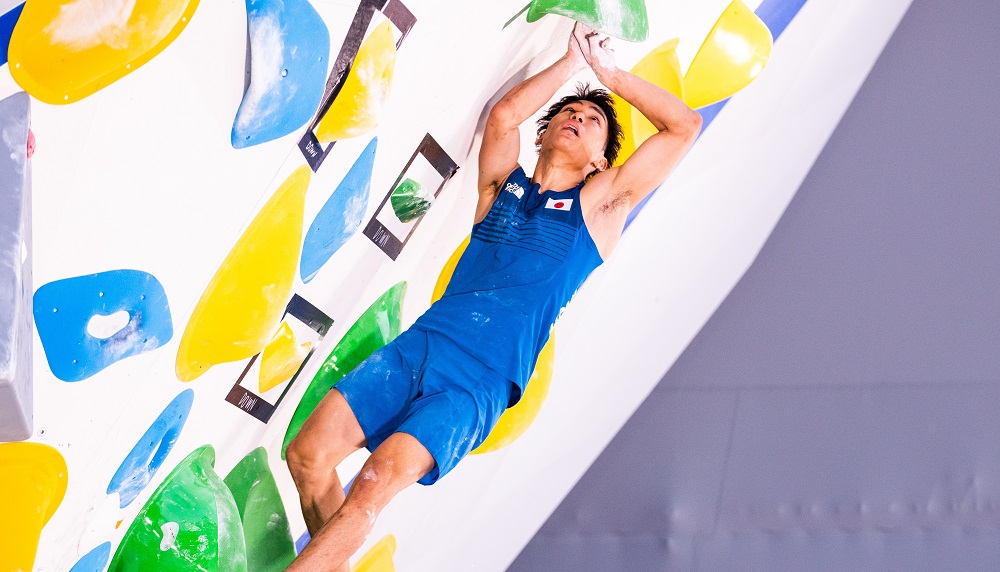
Climbing makes its debut Aug. 3 to 6 at the 2020 Summer Olympics, where 20 men and 20 women will compete in each of the three competition climbing disciplines (bouldering, lead, and speed). A qualification round will determine the top eight climbers across all three disciplines who will advance to the final round. A climber’s score is determined by multiplying together their place out of 20 in each discipline. For example, a climber who places 1st in bouldering, 6th in lead, and 18th in speed would end up with a score of 108 (1*6*18 = 108). The eight climbers with the lowest combined scores will advance to the final round. These eight climbers will then climb in each discipline once again to receive a new, final score that determines the three medallists. For a deeper dive, please check out our explainer.
The statistics and predictions were created using IFSC World Rankings and data dating back to the start of the IFSC World Cup season in April 2019. For each climber, included are basic background information, their IFSC World and Olympic Rankings, their Elo ratings and discipline specific metrics, and their expected finishing position in Tokyo. Also included is a commentary where we think the expected finishing rankings may differ from the metrics. For the ratings, the Elo system is used. Elo is a classic rating system originally developed to provide a relative ranking of players in chess matches.
Given a player’s Elo rating, you can predict their probability of winning a match. Elo by no means creates a perfect ranking system, and external factors materially affect its predictive power. My Elo model was informed by the logic of Guatam Narula and David D’Ambrisi who provided in depth explanations of how they used it to rank multiplayer sports. Each climber starts with an Elo of 1500 and then that number is adjusted after each competition based on their finishing position. The higher a climber’s Elo is, the more likely they are to win. The more a climber participates, the more Elo is certain about their rating. If a climber does not often participate, Elo tends to think they are near the base rating of 1500.
Keep that in mind when looking at the probabilities. You can find the relative strength of any given competition by looking at the median Elo. For the Olympics, the median Elo ratings for the men’s disciplines are 1579 (lead), 1714 (bouldering) and 1487 (speed). For the women’s disciplines, they are 1614 (lead), 1672.5 (bouldering) and 1514 (speed).
It goes without saying that any comments found here about a climber’s skill should be viewed through the lens of the Olympics and their professional competition climbing status. Two climbers per country rule aside, this is a contest to determine the top competition climbers in the world. Finishing 20th still means 20th out of nearly four billion.
On to the climbers in order by expected finish, starting with women:
Women
Janja Garnbret
Commentary: The Elo rating system, as currently constructed, only gives a climber a 10% chance at most to win a 20-person competition. As such this does not adequately reflect the probability of victory for climbers significantly better than the competition. Janja is the highest ranked boulderer and lead climber in the women’s field and her probability of victory should be higher for both. For context on this statement, she won all six bouldering World Cups in 2019. She is firmly first in each metric outside of speed climbing and is the female favorite to win gold.
Akiyo Noguchi
Commentary: Akiyo’s Elo ratings may be lower than expected because I chose to only include results from April 2019 to July 2021. Her dominance prior to that time would increase both her bouldering and lead Elo ratings. She has been planning to retire after the Olympics since before it was delayed into 2021. The metrics indicate she will likely leave the sport as an Olympic medallist.
Miho Nonaka
Commentary: Miho has had solid finishing results throughout 2021 which contributed to high-ranking Elo in all three disciplines. A bouldering specialist, she also posted a third-place finish in speed at Salt Lake City 2021. This was due in part to the fact that only 24 women competed in the World Cup. The result was impressive, nonetheless. An injury at Innsbruck 2021 has kept her out of the most recent competitions. If she is healthy, Miho should be in contention for a medal.
Anouck Jaubert
Commentary: Anouck is one of the four speed specialists who should have a higher probability of victory than the current Elo formula will allow. She is the top ranked speed climber based on Elo and is expected to be the only speed specialist in the final. Given the low multiplier she’ll have for a top speed finish, she has been bumped up two tiers in expected finishing position.
Brooke Raboutou
Commentary: Brooke’s 2021 results have far exceeded her 2019 results. Her Elo has risen across the board in 2021. Brooke’s recent form is the reason for her expected finishing place. High finishes in lead and bouldering at the Olympics could see Brooke make the final and finish in the top five.
Chaehyun Seo
Commentary: Chaehyun was the 2019 Lead World Champion but has not competed in an IFSC World Cup in 2021. The Elo limitations and this lack of competition have lowered Chaehyun’s probability of victory in lead from what it probably should be. She is also second in Median Bouldering Qualifying Tops which indicates her bouldering probability may be higher as well. If Chaehyun’s form matches her metrics she should be right near a top five finish. Due to the uncertainty in her recent form and the likelihood of a speed climber finishing top five, she was moved down in expected finish.
Petra Klingler
Commentary: Petra is another climber with Elo ratings above 1500 for all three disciplines. This puts her above median Elo for bouldering and right near median for lead and speed. Petra has also made the final in the last two Combined World Championships. Her expected finish is just outside the top six due to the likelihood that the speed climbing champion takes up a spot near medal position.
Jessica Pilz
Commentary: Jessica is a lead specialist who should have a higher probability of victory than the Elo indicates in that discipline. Additionally, a lack of 2021 results have not allowed her to continue to improve her lead and bouldering ratings. If she can back up a top three lead finish with a strong bouldering performance, she should qualify for the final.
YiLing Song
Commentary: YiLing has not competed in an IFSC World Cup in 2021 which has hurt her Elo rating relative to competition and in turn her probability of victory in speed. YiLing was the 2019 Speed World Champion and a high finish in the speed qualification should ensure her a spot in the middle of the pack overall. She has been bumped down slightly in expected finishing position as Jaubert has a higher probability of winning the speed qualifier.
Kyra Condia
Commentary: Kyra is a bouldering and lead specialist who also has strong finishes in speed climbing. Her probability of victory in at least one discipline is high due to her all-around skill, though it may prove difficult given the level of competition. She is expected to be close to reaching the finals with top 10 qualifying finishes in each of the three disciplines.
Laura Rogora
Commentary: Laura is the second ranked lead climber based on Elo, so her probability of victory in that discipline is not listed as high as it should be. She won the only lead climbing World Cup of 2020 (only contested by European climbers due to COVID). In 2021, she has a victory and second place finish in lead. A victory in lead would land her a top 10 finish at the Olympics.
Julia Chanourdie
Commentary: High participation and strong finishes in 2021 have allowed Julia’s Elo to be top 10 in the field for both bouldering and lead. These strong finishes will need to continue to avoid the multiplication that will occur with middle of the pack placings. The high concentration of bouldering specialists and lead specialists makes for large uncertainty in expected finishing position for climbers of Julia’s caliber.
Mia Krampl
Commentary: Mia has the fourth-highest lead Elo in the competition due to her success in 2019. This is backed up by her Median Lead Qualifying Score. Finishing high in bouldering and lead could secure her a spot within the top 10, but it will be difficult. Like with Julia, there is just too much uncertainty given the number of bouldering and lead specialists in the 20-climber field.
Shauna Coxsey
Commentary: Shauna finished first in the qualifying round for the 2019 Combined World Championship including a first place in the bouldering competition. Her Elo ratings are largely hurt by only competing in one competition since the 2019 IFSC season ended. Shauna would also benefit significantly if results from 2017 and 2018 were incorporated into the dataset. The uncertainty in her current form coupled with past success made her the most difficult climber to place in expected finish next to Chaehyun Seo.
Aleksandra Miroslaw
Commentary: Aleksandra ranks third in Speed Top Time but first in Median Speed Qualification Time in the Olympic field. The limitations in Elo show a lower probability than Aleksandra’s real probability of winning speed. She is in a race with three other speed climbers to win the qualification speed event and make the combined final. The speed climber who qualifies for the final should walk away with a top five finish.
Alannah Yip
Commentary: Alannah is top 10 in the field according to Elo for both bouldering and speed climbing. She won the 2020 Pan Am Continental Championships to qualify for the Olympics but she has not competed in 2021. The continental championships were not included in the statistics and ratings. Her lack of recent competition gives her Elo less predictive power. Therefore, there is less certainty about her finishing position.
Iuliia Kaplina
Commentary: Iuliia is unranked in the Bouldering World Rankings due to a lack of recent competitions but has competed since April 2019. She is the current speed climbing world record holder for women, achieved at an IFSC non-World Cup event, which is not reflected in her Speed Top Time. Iuliia is one of the four climbers completing to win the speed qualifying title. Her Elo does not adequately reflect her probability of victory in speed especially if she performs at her peak.
Viktoriia Meshkova
Commentary: Viktoriia is a bouldering and lead specialist that won the IFSC Europe Continental Championships to earn a spot in the Olympics. She has only competed in four World Cups in 2021 and therefore, her Elo may not reveal her true skill. Success in the lead and bouldering competitions could see Viktoriia finish higher than expected.
Oceania Mackenzie
Commentary: Oceania qualified with a victory at the IFSC Oceania Continental Championships in 2020. She has not competed in any IFSC World Cups in 2021 which lowers the predictive power of her Elo ratings. Her strongest discipline is bouldering followed by speed climbing. A strong finish in both disciplines could see her compete for a top 15 finish.
Erin Sterkenburg
Commentary: Erin won the IFSC Africa Continental Championships but competed in just three IFSC World Cups in 2021. Erin has also not competed in an IFSC Lead World Cup. This lack of data is largely the reason for her Elo ratings being so close to the base score of 1500. She will need a stronger than expected finish in the speed competition to climb higher in the combined placing.
Men
Adam Ondra
Commentary: Adam’s lead and bouldering probabilities are lower than they should be due to his past success in both disciplines. Additionally, his speed probability is too high as he has the fourth lowest Median Speed Qualification Time in the field and has only participated in three speed World Cups. Adam was the 2019 World Champion in lead and runner-up in bouldering. That dominance has largely continued into 2021 though we have not seen him since Innsbruck in June. A disqualification in lead at the 2019 Combined World Championship is the reason for his low final place. Adam is projected to be on the podium and is the male favorite for gold.
Tomoa Narasaki
Commentary: Tomoa was the 2019 Bouldering World Champion and the 2019 Combined World Champion. Even with the elevated level of competition, Tomoa’s expected win probability in bouldering should be significantly higher than the Elo states. Strength in lead and speed as well gives him the highest expected chance of medaling in the men’s competition.
Jakob Schubert
Commentary: Jakob has been one of the top boulderers and lead climbers in the world over recent years, so his probabilities of victory are likely higher than listed here. Jakob’s probability of winning at least one discipline is second only to Adam Ondra in the field. He finished second in the 2019 Combined World Championship and first in the 2018 Combined World Championship. I expect him to be right near those same spots again in the Olympics.
Rishat Khaibullin
Commentary: Rishat is part of a group of three speed specialists within the men’s competition. His real probability for victory in speed is higher than listed here. He has had higher than expected finishes for lead in 2020 and 2021 which have resulted in an Elo rating of nearly 1500. Rishat’s Elo for bouldering and lead are highest among speed specialists and a win in speed qualifying could see him reach medal position. Given the importance of lower multipliers in the combined score, it should be expected that one speed specialist will finish top 5 and another top 10.
Kai Harada
Commentary: Kai is a lead and bouldering specialist who had a strong ending to his 2019 IFSC World Cup season. He has finished fourth at the last two Combined World Championships. His 2019 Combined World Championship finish also allowed him to go to the Olympics over two other Japanese climbers in fifth and sixth. Kai’s probabilities listed here are slightly lower than they should be due to Elo limitations explained earlier. He should be close to podium position with all around high finishes in qualifying and the final.
Alexander Megos
Commentary: Alex’s Elo ratings are reflective of his true skill due to a high number of World Cups in 2021. Lead is his most successful discipline and as such his probability of victory is likely lower than it should be. He has also posted faster speed times in events not used for this analysis. Alex qualified first in the 2019 Combined World Championship by finishing first in bouldering and lead climbing. Similar results are certainly possible at the Olympics, but he will need to replicate them in the final as well.
Jan Hojer
Commentary: Jan’s frequent appearances in bouldering World Cups land him the highest Elo in that discipline. Based on recent results, I would put the probability of several other climbers winning that discipline above his. Jan is a bouldering specialist who is also in the top 10 for speed. A strong finish in both of those disciplines would land him close to a top five placing. Jan was pushed out of the top six in expected finish since a speed climber in a lower tier will likely finish near medal position.
Jongwon Chon
Commentary: Jongwon’s Elo is likely affected by his lack of World Cups in 2021. He competed in just one bouldering and one lead World Cup. Even so, his bouldering specialty is reflected in his Elo rating, and so his win probability should be slightly higher even with the field strength in that discipline. Jongwon has a higher chance of winning at least one discipline than Nathaniel Coleman. Therefore, he is expected to finish second in Tier 3 behind only the speed champion.
Nathaniel Coleman
Commentary: Nathaniel has been active in the 2021 IFSC World Cup season and posted multiple strong performances in bouldering. His Combined Elo Ranking, 16th, and Combined Olympic Ranking, 5th, have the largest deviation among the Olympians. If Nathaniel can couple a high bouldering finish with middle of the pack lead and speed finishes, he should place in the top 10.
Bassa Mawem
Commentary: Bassa is one of the speed specialists and should carry a higher probability of victory in that discipline than is listed here. Within the dataset, he boasts the lowest Median Speed Qualification Time and the second lowest Speed Top Time by just a few hundredths of a second. He competed in just one bouldering World Cup in 2021 and no speed or lead World Cups. Therefore, Elo may not reflect his current form. A victory in the speed qualifying competition will see him finish in the top 10 at worst.
Mickael Mawem
Commentary: Mickael’s primary discipline is bouldering, but he is in the top 5 for the speed discipline in the Olympics. Mickael has only competed in three lead World Cups within the dataset and so his Elo may not indicate his true skill. At the 2019 Combine World Championship he finished 7th after qualifying for the final. He will be on the fringe of the final at the Olympics and could find a similar placing if he qualifies.
Sean McColl
Commentary: With no lead World Cups and only three World Cups in total for 2021, Sean’s Elo is most likely not developed to his current form. His probability of success in lead is also being undersold. Sean finished 10th in qualifying at the 2019 Combined World Championship with a third-place finish in lead. If he can replicate that same form, expect him to finish near 10th again.
Ludovico Fossali
Commentary: Ludovico is one of three men in contention for the speed qualifying title and his probability of victory within that discipline should be higher than listed here. Ludovico is a frequent participant in each discipline, so his specialty is adequately reflected in his Elo rating. A high finish in the speed event should secure him a spot near 10th, but he will need a 1st place finish to reach the final and achieve a top 5.
Colin Duffy
Commentary: Colin finished first at the IFSC Pan Am Continental Championships in 2020 to gain a spot in the Olympics. He has been active in all three disciplines in 2021 but did not compete at the senior level in 2019. Therefore, his Elo rating has not flushed out his true skill yet. Colin has posted impressive speed times along with strong finishes in bouldering and lead. If he can replicate this in the Olympics, he could creep close to a top 10 placing.
Yufei Pan
Commentary: Yufei has not competed in an IFSC World Cup in 2021, so Elo may not be properly reflecting his current form and likelihood of victory. Even so, his lead and speed Elo are in the top 10, and his bouldering Elo is just outside of it. A high placement in lead or speed could see him finish far higher than his expected finishing position.
Alberto Ginés López
Commentary: Alberto has been competing constantly in 2021 and was the only Olympic athlete to compete at the Briançon competition on July 18th. Due to other lead specialists not competing in as many World Cups, Alberto’s probability of winning lead is the highest according to Elo. However, Alberto is not the strongest lead climber in the Olympics and future iterations of the win probability model will incorporate information independent of number of results. A high finish in the lead contest would result in Alberto finishing towards the middle of the pack overall.
Alexey Rubtsov
Commentary: Alexey is a bouldering specialist and has continued to post top 15 finishes in IFSC World Cups in 2021. However, he competed in no speed World Cups and only one lead World Cup in 2021. Therefore, his Elo in those disciplines is likely not reflective of his current form. Alexey will most likely need a high finish in the bouldering competition to compete for a middle of the pack final placing.
Michael Piccolruaz
Commentary: Michael has been an active participant in World Cups within each discipline and competed as recently as July 2021. Despite a bouldering Elo over 1700, he is still slightly outside of the top 10 in this discipline. Look for him to be on the cusp of a top 10 finish in both the bouldering and speed qualifying events.
Tom O’Halloran
Commentary: Tom won the 2020 IFSC Oceania Continental Championship. Tom has not competed in any lead climbing World Cups in 2021. Additionally, he has not competed at a IFSC World Cup in bouldering or speed climbing. Because the speed climbing wall and format does not change, I included his times from the IFSC Oceania Continental Championship to get a better indication of his likely speed performance. This lack of results drastically lowers the predictive ability of his Elo ratings which sit at the 1500 base level.
Christopher Cosser
Commentary: Christopher qualified for the Olympics with a first-place finish at the 2020 IFSC Africa Continental Championships. He competed in many of the 2019 World Cups but has not competed in 2021 since Salt Lake City in May. His World Ranking in speed has improved in 2021 and that is the likely discipline that could help his placing in Tokyo.
Summary
References
IFSC Profiles, Results and World Rankings: https://www.ifsc-climbing.org/index.php/athletes / https://www.ifsc-climbing.org/index.php/world-competition/ranking
Multiplayer Elo Methodology: https://www.gautamnarula.com/rating/ (Narula, G. (2012, December 16). Building a Multiplayer Elo Rating System. Gautam Narula) https://georgetownsportsanalysis.wordpress.com/2017/11/19/building-a-modified-elo-rating-system-for-nascar/ (D’Ambrisi, D. (2017, November 19). Building a Modified Elo Rating System for NASCAR. Georgetown Sports Analysis)
